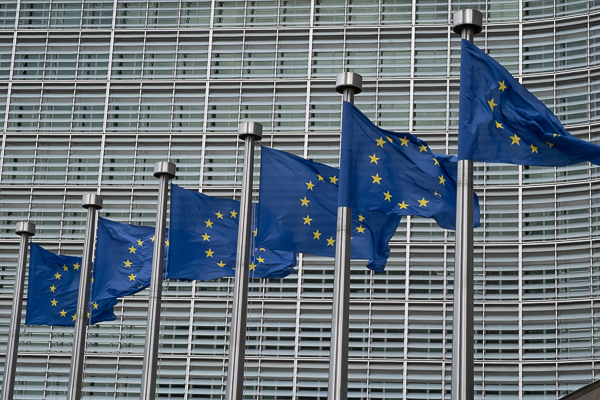 EU flags in front of the Berlaymont building, headquarters of the European Commission, in Brussels, Belgium;
Credit: Ali Sahib, Chronicle.lu
EU flags in front of the Berlaymont building, headquarters of the European Commission, in Brussels, Belgium;
Credit: Ali Sahib, Chronicle.lu
The European Commission has adopted the 2030 Consumer Agenda, a strategic plan for EU consumer policy for the next five years.
With 450 million consumers in the single market, who contribute to over 51% of the EU's GDP through household spending, consumers play an essential role in the engine room of the economy, stated the Commission. Enhancing consumer trust, ensuring legal clarity, bolstering enforcement and easing administrative processes for businesses are key aims of the agenda's actions, which are designed to foster consumer protection and promote competitiveness, social fairness and sustainable growth across the European Union.
While European consumers enjoy some of the highest levels of protection worldwide, according to the Commission, there is a need to adapt the framework to keep up with the rapidly changing landscape marked by increased living costs, evolving market practices, particularly online, and the surge in e-commerce. A strong consumer policy is not just about protecting consumers, but also about shielding EU compliant companies and protecting them from unfair competition from non-compliant traders, added the Commission.
The 2030 Consumer Agenda introduces new initiatives to address these challenges effectively, focusing on four key priority areas:
- Completing the Single Market for consumers: an Action Plan for Consumers in the Single market to eliminate cross-border obstacles for consumers and boost opportunities for businesses. This action plan includes the evaluation of the Geo-Blocking Regulation, to assess whether it has met its objective to eliminate unjustified geo-blocking and other forms of discrimination based on nationality, place of residence or establishment. The Commission will also seek to enhance access to cross-border financial services, including the possibility of opening a savings and investment accounts in another Member State;
- Digital fairness and consumer protection online: the Commission will propose, in 2026, a Digital Fairness Act (DFA) to strengthen the protection of consumers in the digital environment, against practices such as dark patterns, addictive design features or unfair personalisation that takes advantage of consumers' vulnerabilities. The Digital Fairness Act will pay particular attention to the protection of children online to reduce the exposure of minors to harmful practices and features in digital products. The Commission will also simplify rules for businesses and explore how digital solutions can reduce administrative burden for companies and improve access to information for consumers. Reinforcing the protection of consumers against online fraud will also be an important area of work;
- Promoting sustainable consumption: the Commission will support Member States in the implementation of EU product and consumer laws, which protect consumers against greenwashing, promote a wider offer of sustainable goods and facilitate the durability and repairability of products. The Commission will also support the circular economy by working with stakeholders to promote the return of goods that are no longer used, second-hand markets or innovative circular startups;
- Effective enforcement and redress: the exponential growth of e-commerce has led to the growing circulation of unsafe or uncompliant products originating mostly from third countries. In 2026, the Commission will prioritise the review of the Consumer Protection Cooperation Regulation to strengthen enforcement, protect consumers from market players who do not respect the rules and shield compliant businesses from unfair competition. In this respect, the Commission will assess the need for centralising enforcement powers in specific cases and how to further strengthen coordination among national authorities. To tackle the non-compliance of products sold on our market, the Commission will ensure the effective enforcement of the General Product Safety Regulation (GPSR) and propose a revision of the rules on market surveillance. The EU will also continue to cooperate directly with third-countries, to tackle product safety at the source.
The Commission explained that the implementation of the 2030 Consumer Agenda will be discussed at the Annual Consumer Summit. The Commission will also convene regular Ministerial Forums on consumer protection to provide high-level political guidance to the implementation of the Agenda.








